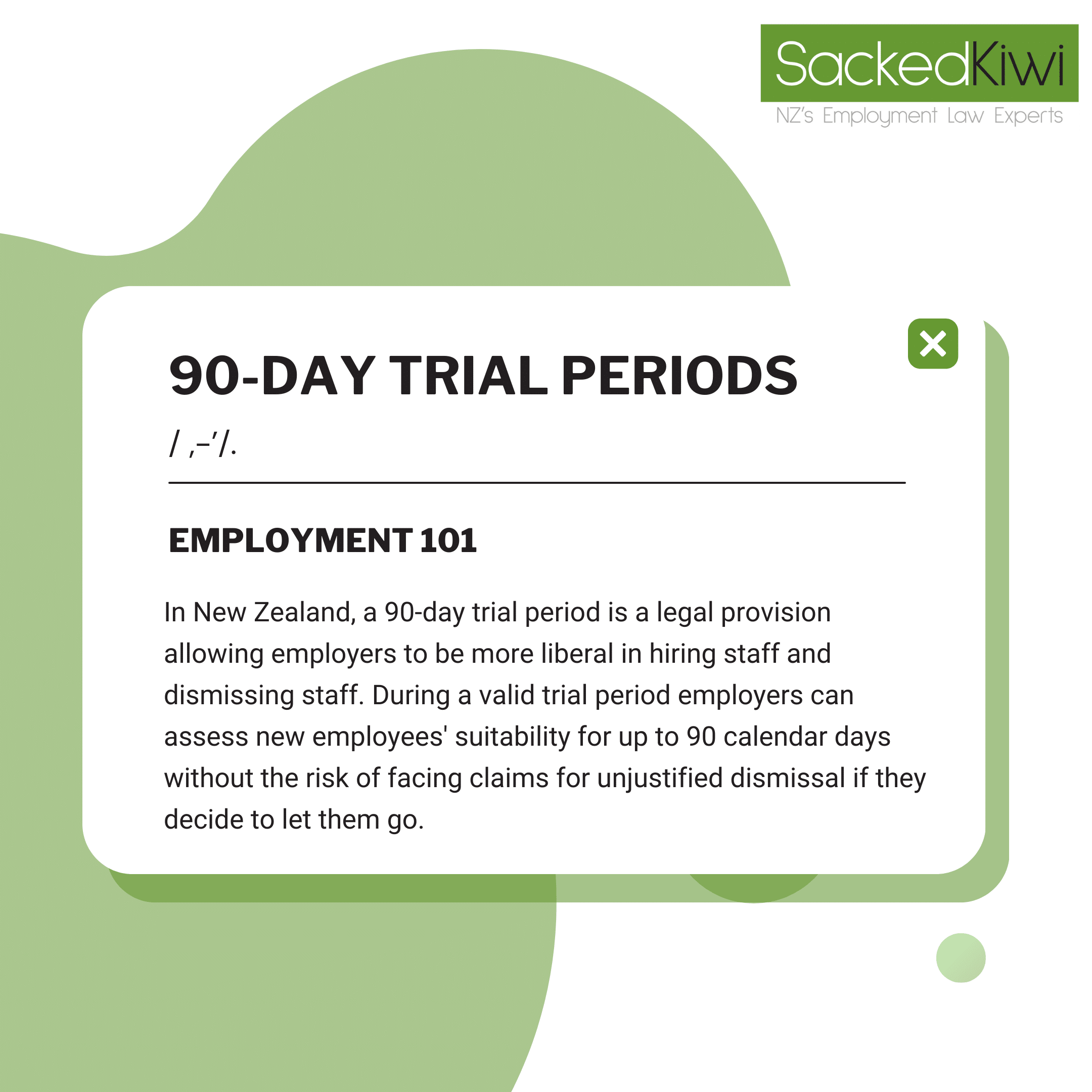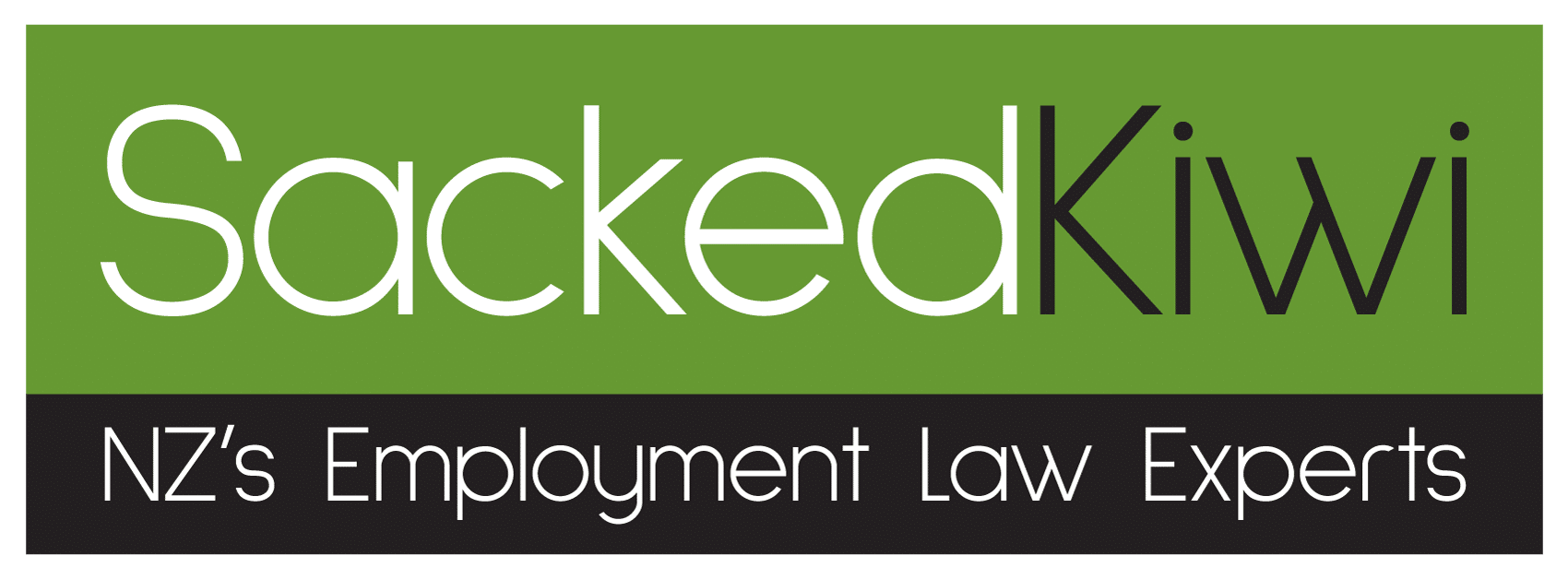
What is a 90-Day Trial Period?
In New Zealand, a 90-day trial period is a legal provision allowing employers to be more liberal in hiring and dismissing staff. During a valid trial period, employers can assess new employees’ suitability for up to 90 calendar days without the risk of facing claims for unjustified dismissal if they decide to terminate them.
During this time, employers have the freedom to evaluate an employee’s fit for the job without the usual legal obligations. If the employer finds that the employee isn’t the right match within the 90-days, they can end the employment without needing specific reasons or following standard termination procedures. It is important to note that 90-day trial periods are the only trial periods available in New Zealand.
However, there are strict criteria for this trial period to be legally binding. Not all employees are automatically subject to this trial, and certain conditions must be met. For instance, a written employment agreement that includes the 90-day trial clause must be provided before the employee starts working.
Employees under this trial period still have fundamental rights, such as the minimum wage and entitled holidays as per the law. The trial period mainly simplifies termination within the initial 90-days allowing employer to summarily fire an employee.
What is a 90-Day Trial Period Clause?
When you start your employment with a new company a 90-day trial period may be written into your contract. It’s important to understand that 90-day trial periods are a piece of opt-in legislation meaning they do not automatically apply to all contracts and only have effect when written in.
Due to the 90-day trial periods being opt-in legislation the Employment Relations Authority only recognises valid 90-Day trial period clauses with clear and specific drafting. When an employment agreement includes vague drafting often the Employment Relations Authority (ERA) have determined the trial period provision becomes null and void. Two key aspects of trial period clauses that the Authority requires clear drafting are the period and commencement date of such trials.
- Specified Period:
- The trial period must have a clearly specified timeframe, up to a maximum of 90 calendar days. Ambiguity in the period’s duration renders the trial period provision invalid.
- Commencement Date:
- The employment agreement must precisely state the commencement date of the trial period. Unclear commencement dates can void the 90-day trial clause.
What are the exceptions to 90-Day Trial Periods?
Understanding these exclusion criteria is vital for employers to ensure compliance with New Zealand employment law when implementing 90-day trial periods. Proper adherence to these conditions helps in creating legally binding employment agreements and ensures fairness for both employers and employees.
- Bargaining Exception:
The bargaining exception excludes the 90-day trial period if the employer and employee have engaged in collective bargaining through a union, and the collective agreement doesn’t allow for such trial periods. In these cases, the trial period provision becomes null and void.
- Clear Drafting:
90-Day Trial periods in New Zealand must have a clear and specific drafting, often when an employment agreement includes vague drafting the Employment Relations Authority (ERA) have determined the trial period provision becomes null and void.
- Pre-Existing Employees:
Employees who have worked for the same employer in any capacity before are not eligible for a 90-day trial period. It’s essential to clarify that this provision cannot be applied retrospectively to previous employees. If an employee has a pre-existing relationship with the employer, attempting to establish a trial period would render it null and void.
What is a Probationary Period?
A probationary period is an agreed-upon timeframe—often longer than 90-days—where both employers and employees assess job fit and performance, typically through structured reviews and goal setting. An Employment Agreement can have either a 90-day trial period or a probationary period and should not have both periods simultaneously in the agreement, they are mutually exclusive.
For both the trial and probationary periods to be legally binding, specific terms and conditions must be outlined in the employment agreement provided to the employee before they start working.
For an employer to terminate employment during a probationary period they must follow the same
Employees under both periods retain basic rights, including the minimum wage, holiday entitlements, and other benefits as per New Zealand employment laws. However, understanding the nuances between these periods is vital for both employers and employees to navigate employment agreements effectively and ensure fair and lawful employment practices in New Zealand.
What are my rights during a 90-day trial period?
While your ability to file a personal grievance for unfair dismissal if your fired during a 90-day trial is limited, you still maintain several fundamental rights and freedoms. These include basic legislated employment rights, health and safety protections, protection from discrimination, the right to fair treatment, a written employment agreement, notice of termination, access to the grievance process and legal recourse for unjustified actions.
Basic Rights
- As protected by legislation, during a 90-day trial period you are entitled to the same basic standard employment rights as people not on trial. You are entitled to minimum wage, rest breaks, public holidays and more as prescribed by New Zealand law.
Health and Safety Protections
- You also have the right to a safe working environment regardless of your 90-day trial. Employers are obligated by legislation to ensure their employees work in a safe and healthy workplace free from harm.
Protection from Discrimination
- 90-day trials do not prevent you from being safeguarded from discrimination. Even on a trial period, you have the right to work free from discrimination on any grounds. You are protected from discrimination based on race, gender, age, disability, religion, sexual orientation, and family status. If you are being discriminated against on any of these grounds or terminated for any of these reasons you are protected and have a right to a personal grievance.
Right to Fair Treatment
- While the purpose of a 90-day trial period is to enable employers to more freely hire employees with the knowledge they are protected with the ability to easily fire them, they are still obligated to act in good faith and fairly with their employees. Under a 90-day trial, you have the right to fair treatment.
Access to the Grievance Process
- While you are blocked from filing a personal grievance for unfair dismissal in the event your employer terminates you, employees still have the right to raise concerns or grievances related to their employment during the trial period. Trial periods do not prevent or bar employees’ access to internal dispute resolution procedures or justice.
Notice of Termination
- If an employer decides to fire you during a 90-day trial period, they are still required to act in good faith and provide reasonable notice, or payment instead of notice of termination.
A Right to Justice
- Employees have the right to challenge any unjustified actions taken against them during the trial period, such as unfair treatment, discrimination, or breaches of employment rights. As seen above.
Understanding these rights is crucial for employees to ensure they are treated fairly and lawfully during a 90-day trial period. It’s recommended to review the employment agreement carefully and seek advice or clarification if needed to ensure proper protection of rights during this period.
How does dismissal work with a 90-Day Trial Period in NZ?
A 90-Day Trial differs from a standard employment relationship when it comes to protections for workers from termination. These include specifically:
- Right to Terminate Employment Without Specific Reasons:
Employers have the authority to terminate employees within the 90-day trial without providing specific reasons or adhering to the usual firing procedures required in standard employment conditions.
- No Prior Notice Obligation:
Employers are not required to give advance notice before terminating an employee during the trial period, unless the employment agreement explicitly states otherwise.
- Exclusion from Personal Grievance Claim:
Employees fired during the 90-day trial period cannot directly file a personal grievance claim linked to their dismissal.
- Discrimination, Bullying, or Harassment Exceptions: ‘
While a 90-day trial restricts employees from directly filing a personal grievance concerning termination, if discrimination, bullying, harassment, or breaches of protected rights are involved, a personal grievance may be heard.
Understanding the dismissal process during a 90-day trial period is essential for both employers and employees in New Zealand. Employers should be aware of their rights and obligations, while employees should understand their level of protection and the process surrounding dismissal within this trial period.
What is the process for filing a personal grievance for a dismissal under a 90-day trial period?
If you believe you were unfairly dismissed during a 90-day trial period, the process for filing a personal grievance involves lodging a complaint with the Employment Relations Authority. Sacked Kiwi’s team of experts is ready to help you navigate this process. Contact Us for support and guidance in filing your claim. Contact them here!
Legal Disclaimer: The content posted on the Sacked Kiwis website should not be considered or relied upon as legal advice or opinion. The information presented here is not intended to serve as legal guidance. Over time, laws and regulations evolve, potentially altering the accuracy of previously shared information. Updates in jurisprudence or legislation, which could happen without immediate notice, may render the legal information on this platform outdated or obsolete.
Should you need employment advice, please don’t hesitate to contact us through our toll-free hotline.

